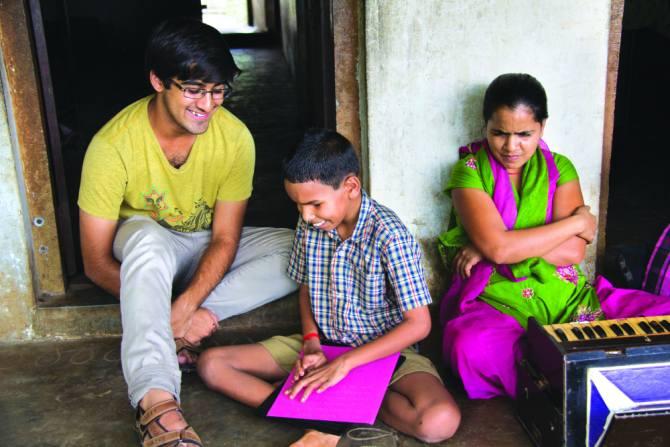
US-based Param Shah, 18, who helps disabled Indian children bloom talks to Ritu Jha about the challenges and joys of his job.
Last summer, Irvine, California-based Param Shah, 18, travelled to remote villages in the Himalayan region on a project. On his return, he established the Lotus Foundation, a non-profit that provides care for children with disabilities in India.
“The lack of disabilities care in India sparked my desire to start this project,” Param, founder and chief executive officer of the foundation, told India Abroad.
The lotus flower, he said, symbolises India, and “can also be a metaphor for the lives that we could help bloom to their full potential with our work.”
Param runs the foundation from his home, in partnership with another non-profit, the Chinmaya Organisation for Rural Development.
The majority of the work takes place in North India, in villages surrounding Sidhbari, Himachal Pradesh, as well as villages in Gujarat.
Their project deals with treating children with cerebral palsy, muscular dystrophy, spina bifida (a birth defect that affects spinal bones), mental retardation, and other medical illnesses. They provide medical equipment and devices like cerebral palsy chairs, prosthetic devices, water bags, and orthotics devices.
Param, a high school student, is also the president of the Wolfpack club at his school, which integrates general education and special education students to create a fun environment in which the latter can develop social skills.
“It was my passion working with these special education students,” Param said.
Working for such children is not easy in India, he said. The main challenge for him was the lack of awareness among parents in the villages about neuro-degenerative diseases. There is a stigma attached to children with disabilities in rural India, and often parents can do nothing to help their disabled child because they are not aware of the disease in the first place.
“Spreading awareness of these diseases is becoming a major part of my project in order to eliminate the prevalence of these diseases in the future,” Param said.
“My largest supporters are my family of course, the ones who inspire me to keep working and improving. My friends are huge motivators as well, taking my cause to their hearts as well and helping in whatever way they can.”
When he started the project, Param said, he was more focused on fundraising and had no real direction until he started working in the Himalayan villages.
“After four months of success in this project, someone told me that I am truly changing children’s lives with my work,” Param said.
“After my grateful dismissal of this comment, he told me that even if my organisation couldn’t help the children walk again, I am giving them a sense of importance, a chance in life, which is truly rare in their situation. Taking this to heart, I continue to improve my organisation’s work everyday, because if my efforts can make some child’s life a little better, it’s all worth it.”
His work keeps him busy, and he often wishes there were 30 hours to a day to juggle his studies and his passion.
“After the homework, studying, club meetings, college applications, I practice setting aside an hour or two to work to advance my organisation’s efforts,” Param said. “It’s extremely challenging, but I am totally invested in my work for this cause, so it doesn’t feel like time is being taken up.”
Param’s parents are from India. His mother died of cancer when he was 9 years old.